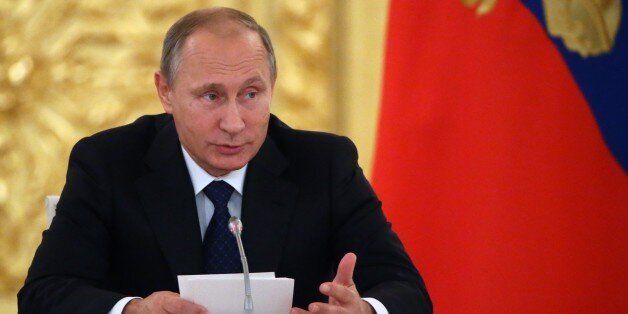When Boris Yeltsin appointed Vladimir Putin prime minister in 1999, Putin had an approval rating in Russia of 31 percent. About 37 percent of Russians didn’t even know who he was. After a series of mysterious bombings in Moscow, Putin blamed Chechen separatists and promised to flush Chechens down their toilets (his words). Bombing began in October of that year. By 2000, Putin’s poll numbers hit 84 percent. Putin needed a win, and he got one. That was a formative political experience. Times are hard in today’s Russia. Falling oil prices have taken a serious toll, and Western sanctions haven’t helped. Prices have surged 16 percent since August, and the ruble has fallen 5.5 percent against the dollar. Russia’s economy will shrink 3.4 percent this year. No one, not even Russian state officials, expects economic conditions to improve much anytime soon. With power comes responsibility. That’s the downside of being as powerful as Putin is in Russia. He can blame others for Russia’s problems but he needs to keep putting wins on the board. On Feb. 22, 2014, Ukrainian protesters infuriated the Kremlin by ousting then-President Viktor Yanukovych, Moscow’s man in Kiev, and Putin moved quickly to flex his muscles. By Feb. 27, the streets of Crimea were filled with men in ski masks carrying automatic weapons. Locals then voted in a referendum to trade Ukrainian for Russian citizenship, and Putin held aloft his trophy for all to see. Within a few more days, his domestic approval numbers spiked from 65 percent to 80 percent, and he is still riding that wave of popularity.
Times are hard in today’s Russia.
Next, to ensure that the rest of Ukraine did not slip from Russia’s orbit, Putin backed ragtag Russian separatists in two border provinces, Donetsk and Luhansk. It was a move meant to force Ukraine’s cash-strapped national government to rewrite the country’s constitution to give local governors (even in breakaway provinces controlled by Russian separatists) a veto over Ukraine’s national foreign and trade policies. That would allow Putin to halt Ukraine’s next lunge toward Europe before it starts. He hasn’t yet gotten that veto but he has clearly won a stalemate. Ukraine remains frozen in Russia’s shadow, and Putin can tell Russians that he has helped freedom fighters beat back the advance of Western aggressors toward Russian borders.
Now he’s bombing in Syria. With this gambit, Putin accomplishes two things. First, he is reminding Western governments that Russia remains a central player outside its neighborhood. U.S. officials charge that Russians are not bombing ISIS but attacking U.S.-backed rebels determined to oust Bashar al-Assad, a longtime Russian ally. True or not, Putin has already established new facts on the ground, and unless President Obama wants U.S. pilots to confront Russian fighter jets, it’s not clear what can be done.
Second, by bolstering Assad, he protects Russia’s position in the region. Syria gives Putin a foothold like no other in the Middle East, in part because Assad allows Russia a naval base at Tartus, along Syria’s southern coastline. This is a vital port on the Mediterranean and the only Russian military base outside the territory of the former Soviet Union. U.S. and European efforts to oust Assad threaten that Russian foothold, and Putin is determined to prove that Russia will not be pushed out. As in Ukraine, this strategy is likely to work. It’s also likely he’ll heighten terrorist risks inside Russia, especially when the Russians get around to targeting Isis, but that’s a problem for another day.
To delay his day of judgment at home a little longer, Putin needs victories — particularly those that burnish Russia’s image as a world power.
Russia’s economy is in bad shape and is getting worse. Its government still draws half its revenue from the export of oil and gas. More than two thirds of all export revenue comes from product pumped from the ground and shipped out. The Russian economy is even less diversified than when Putin first came to power 15 years ago. That’s a problem, given that oil prices are unlikely to rebound anytime soon. The world is already awash in crude oil, and the end of sanctions on Iran will likely add another one million barrels per day by the end of next year.
For now, Putin can blame those economic problems on Western sanctions. The vast majority of Russians get their news from state-dominated television channels, and there is plenty of demand across that country for stories that explain how the West in general and Americans in particular are trying to keep Russia on its knees. Nearly 90 percent of Russians “have confidence in Putin to do the right thing regarding world affairs.” Two thirds have high confidence in his leadership.
Here’s the real kicker: 73 percent of Russians are unhappy about the state of their economy, but seven in 10 approve of the way Putin is handling it. In part, that’s because Putin’s wins in Ukraine have restored a lot of lost Russian pride. Recent polls also show that 63 percent of Russians have a “very favorable” view of their own country, up from just 29 percent in 2013 and 51 percent in 2014. Therein lies the key to Putin’s political success.
He is reminding Western governments that Russia remains a central player outside its neighborhood.
Still, at some point, Russians will expect their powerful leader to deliver better times at home. To delay that day of judgment a little longer, Putin needs victories — particularly those that burnish Russia’s image as a world power. Once again, he’s getting them. For now, he’s on a roll — and an international force to be reckoned with.





